Gratitude is more than a polite thank you. It is a mindset, a deep feeling of appreciation, and a tool to improve your everyday life. The power of gratitude: a soulful blessing in everyday life is something science and spirituality agree on. When you learn to be thankful, you change your mind, your emotions, and your relationships. This article explores the full picture: from what is gratitude to how it can shape your brain and heart.
What is Gratitude? (Definition & Meaning)
What is gratitude? Simply put, it means being thankful. It’s the feeling you get when someone helps you, or when you notice the beauty of the world around you. But it’s also a deeper emotion. Gratitude is the heart’s response to life’s gifts, both big and small. You can be grateful for a smile, a sunrise, or the strength to get through a hard day. Gratitude and happiness often go hand-in-hand because when you appreciate life, you naturally feel better.
In psychology, gratitude meaning in psychology is a positive emotion that helps you focus on what is good. It’s more than feeling good. It’s a state of mind that changes your brain and improves your life. That’s why practicing daily thankfulness can be such a powerful habit.

Why Is Gratitude Important for Mental & Emotional Wellbeing?
Why is gratitude important? Because it protects your mental and emotional health. Feeling thankful lowers stress, boosts your mood, and makes you more optimistic. The effects of thankfulness are clear in science: fewer symptoms of depression, more sleep, and greater life satisfaction. When you count blessings, your brain focuses on what you have, not what you lack.
Also read:Healing Through Forgiveness: A Journey to Inner Peace
Gratitude also builds emotional resilience. People who face difficulties with a thankful heart often recover faster and feel more supported. They manage emotions better and cope with change in healthier ways. Gratitude and mental health are closely linked. This simple act of saying “thank you” can change how your mind reacts to life.

Gratitude in Positive Psychology
Gratitude and positive psychology go hand-in-hand. Experts like Dr. Martin Seligman found that thankfulness helps people live better, not just feel better. In positive psychology, gratitude is considered a key strength. It helps people thrive.
Gratitude meaning in psychology includes noticing, thinking about, and appreciating the good in life. This mindset builds positive emotions, which leads to better choices and deeper relationships. Gratitude helps form a strong, positive base for everything else in life.

The Role of Gratitude in Everyday Life
In daily life, gratitude shows up in small ways. You might say thank you to a barista or feel thankful for a warm cup of tea. These daily appreciation habits build up over time and shape how you see your world.
Even when life is hard, cultivating gratitude can make the hard parts easier. You might be thankful for lessons, support, or simply making it through the day. Gratitude doesn’t ignore pain. It helps balance it.

The Power of Thanksgiving & Appreciation
Giving thanks isn’t just a holiday tradition. It’s a daily practice that brings deep joy. The spiritual benefits of gratitude are many. Feeling thankful helps you feel connected—to people, to life, and to something bigger than yourself.
When you show simple ways to show appreciation, others feel valued. And you feel the warmth of kindness and connection. Gratitude improves relationships because it shifts focus from what’s wrong to what’s good.
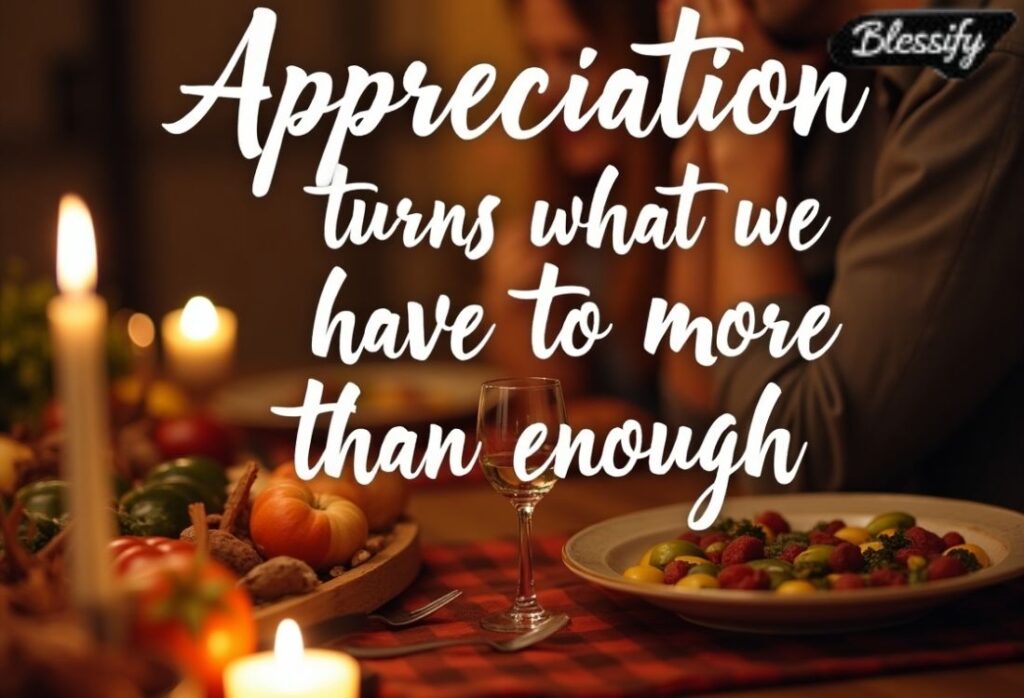
How to Practice Gratitude in Daily Life
So, how to practice gratitude? Start simple. Keep a small notebook and each night write three good things from the day. That’s called gratitude journaling. Speak thankfulness out loud. Pray or meditate with thankfulness in mind.
Build daily gratitude tips into your routine. Say thank you to others more often. Take a walk and notice beauty. Send a thank-you message to someone who helped you. These small acts build a gratitude habit that can transform your day.
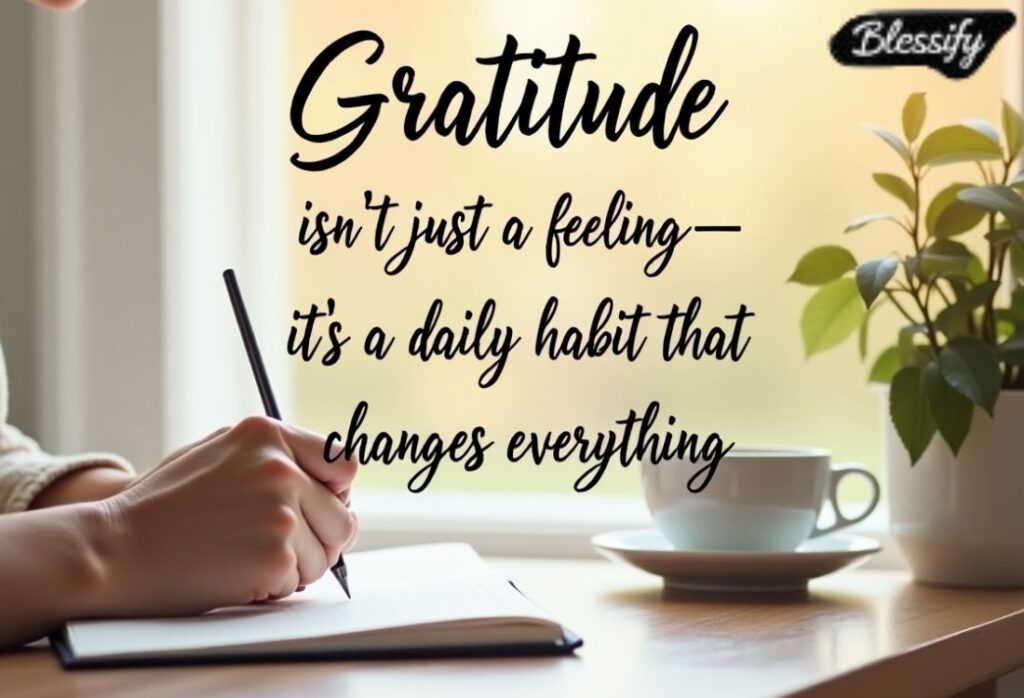
8 Gratitude Exercises to Boost Wellbeing
You can try many gratitude exercises list to grow your thankful heart. Here are some ideas:
| Exercise | Description |
|---|---|
| Gratitude Journal | Write 3 good things daily |
| Gratitude Jar | Fill a jar with notes of things you love |
| Thank-you Letter | Write to someone who changed your life |
| Nature Walk | Notice beauty and feel thankful |
| Gratitude Meditation | Focus on things you’re thankful for |
| Gratitude Text Challenge | Text one thank-you per day |
| Photo Gratitude | Take a daily photo of something you appreciate |
| Daily Blessings List | Name your blessings each morning |
These actions build a stronger positive mindset and improve your emotional wellbeing.
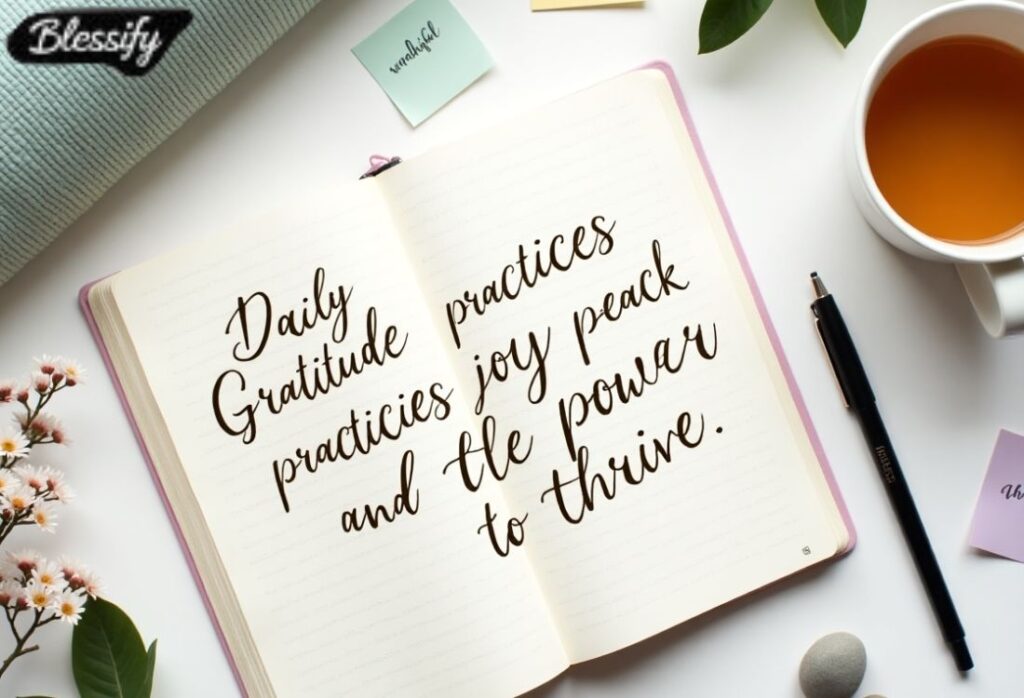
The Science Behind Gratitude – What Research Says
The scientific benefits of gratitude are powerful. In brain scans, researchers found that people who feel thankful show more activity in the brain’s reward centers. This is part of the neuroscience of gratitude. Gratitude changes how your brain works.
Also, research studies on gratitude show that people who write in gratitude journals sleep better, feel happier, and even exercise more. These are long-term changes. That’s the impact of gratitude on the brain.
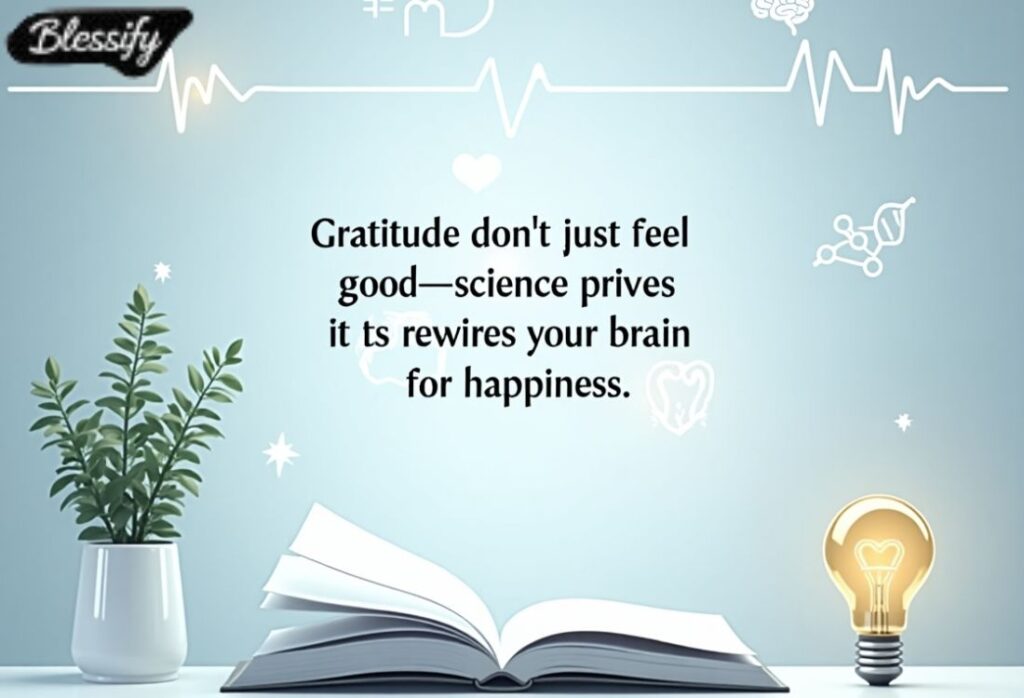
Common Myths About Gratitude You Should Stop Believing
There are many myths about gratitude. Some people think being thankful means ignoring pain. That’s not true. Gratitude doesn’t mean you deny your problems. It means you find something good even during hard times.
Others believe that thankfulness is fake or forced. But gratitude therapy shows that even if you don’t feel it at first, the practice works. Like building a muscle, the more you practice, the more natural it feels.

Teaching Gratitude to Children and Teens
Teaching kids gratitude is one of the best gifts you can give. Start with thankfulness activities for kids like drawing, storytelling, or saying what they’re grateful for at bedtime. Kids learn by watching. So model thankfulness every day.
For teens, try gratitude journaling ideas or social media challenges. When young people learn to value what they have, they grow up stronger and kinder.
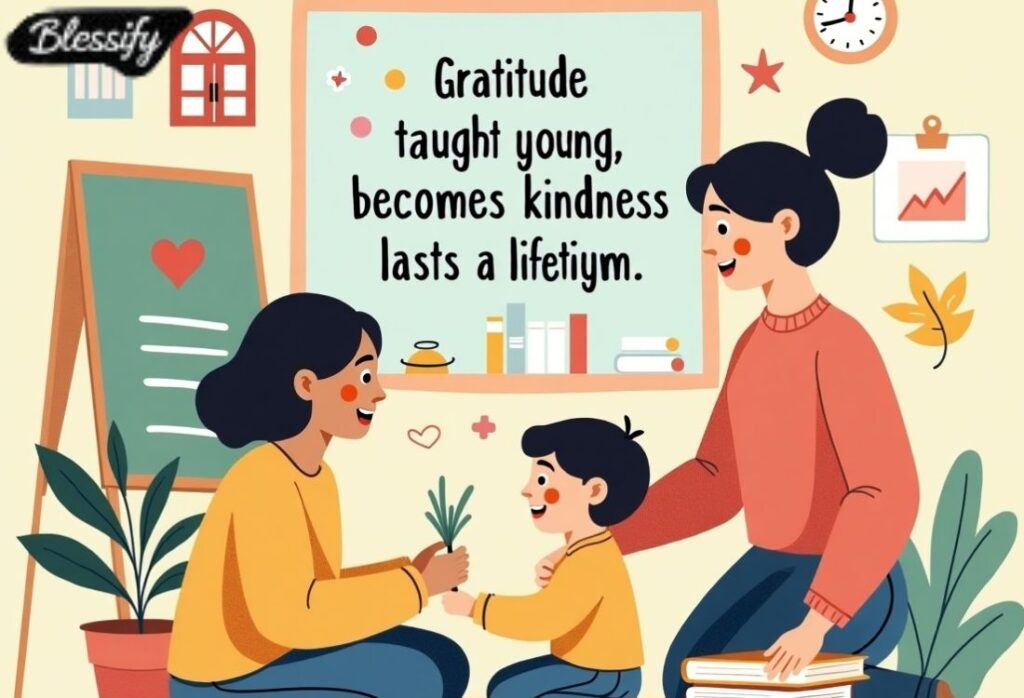
Gratitude Challenges – 7, 14, and 30-Day Ideas to Try
A gratitude challenge ideas plan can help you stay on track. Choose a timeframe and try something new each day. For 7 days, write one thank-you note daily. In a 14-day challenge, try a mix of journaling and acts of kindness. A 30-day challenge may include meditation, photo gratitude, and reflection.
You can share this with friends or family. This helps build gratefulness in relationships. Group challenges often make people feel more connected and committed.
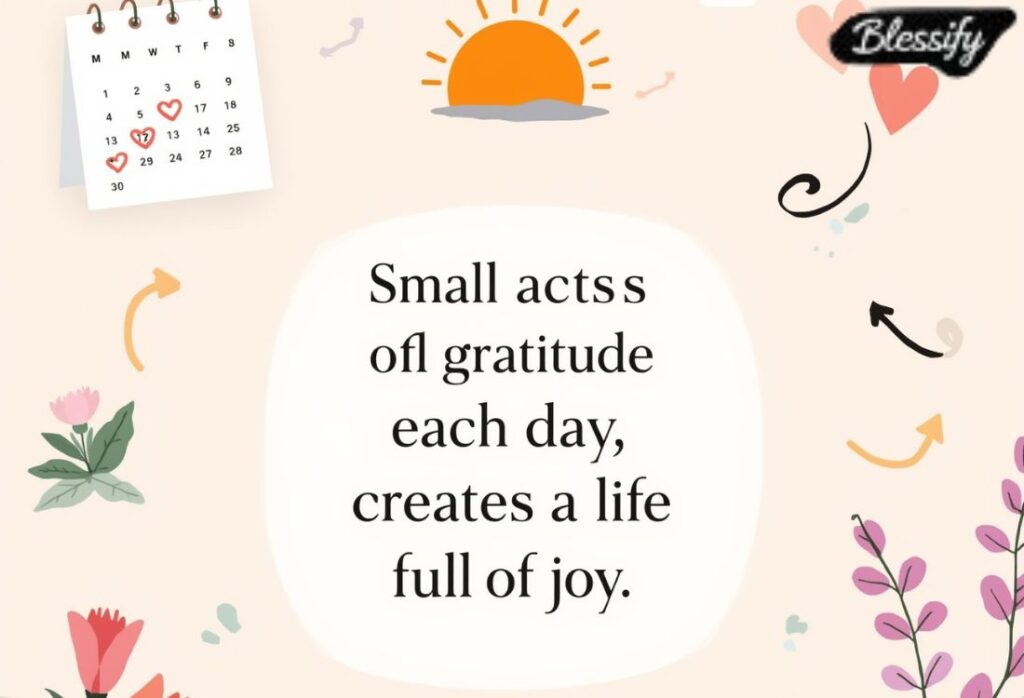
How Gratitude Transforms Relationships
Thankfulness builds trust, love, and joy. When you show appreciation to your partner, friend, or coworker, they feel seen and valued. This is how gratitude improves relationships. It’s not about big gifts but small moments of love.
Couples who practice mindfulness and gratitude tend to argue less and support each other more. Even a simple “thank you” can warm the heart and heal past wounds.

Final Thoughts: A Take-Home Message
The power of gratitude: a soulful blessing in everyday life is a gift we all can use. Gratitude opens hearts, calms minds, and lifts spirits. Whether you journal, meditate, or simply whisper “thank you” before bed, your life will change.
In the end, gratitude is not about being perfect. It’s about noticing the light, even when it’s dim. Let it guide your way forward. Let it bless your every day.
“Gratitude turns what we have into enough.” – Aesop
FAQs
What is the power of gratitude?
The power of gratitude lies in its ability to shift your mindset, boost happiness, and strengthen emotional resilience.
What is the purpose of gratitude?
The purpose of gratitude is to help you focus on the good, create a positive mindset, and build meaningful connections.
What are the 4 A’s of gratitude?
The 4 A’s of gratitude are Appreciation, Acknowledgment, Acceptance, and Attention—they guide how we recognize and express thankfulness.
What are the 7 benefits of gratitude?
Gratitude improves mood, boosts mental health, strengthens relationships, enhances sleep, reduces stress, increases self-esteem, and promotes physical health.
What are the 3 qualities of gratitude?
Gratitude is intentional, reflective, and heartfelt—it involves noticing, valuing, and expressing appreciation sincerely.


Welcome to Soulfulblessing! I’m Jav Jav — an AI-powered SEO and content writer with over 2 years of experience crafting engaging, search-optimized content that drives results.

